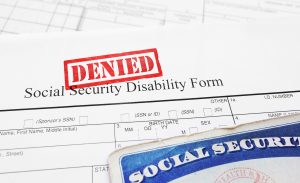
Each year, millions of individuals file for Social Security Disability Insurance (SSDI) and other types of disability benefits from the Social Security Administration. Unfortunately, statistics reveal that only 30 percent of these claims are accepted. There are many reasons why the Social Security Administration Administration (SSA) denies an individual’s claims, but some of the most common reasons for these denials include the following elements. For individuals who wish to appeal a decision by the SSA, it is often important to understand the basis for these denials as well as to retain the assistance of a knowledgeable disability attorney who can help receive benefits.
An Applicant’s Medical Condition Won’t Last Long Enough Or Is Not Severe Enough
A medical condition must be severe enough to prevent an individual from working for one year or more or result in the death of the applicant. Applicants who have conditions that do not meet these standards will be denied SSDI benefits.
A Disability Is Primarily Due to Alcohol or Drug Abuse
An individual will be denied SSDI benefits if their disability was caused by alcohol or drugs and would improve if the individual quit use of these substances. If this addiction is not the primary cause of a person’s disability, an individual might still be able to obtain SSDI benefits.
An Applicant Lacks Medical Evidence
To be eligible for SSDI benefits, an applicant must convince the SSA that the individual has a severe medical condition that prevents them from working gainfully. Detailed medical records are often essential to prove this disability. Many applicants are denied SSDI benefits due to failure to provide sufficient medical evidence.
The Social Security Administration is Unable to Contact the Individual
If an individual moves or changes their phone number, the individual must make sure to update the SSA with new contact information. If the SSA cannot reach an individual to discuss the details of a claim, an individual is likely to be denied SSDI benefits.
The Disability Applicant Has Been Incarcerated
Individuals who are currently incarcerated cannot receive disability benefits. Individuals must wait until they are released from prison to obtain benefits. Individuals who experience a disability due to the commission of a felony are also ineligible for benefits. Individuals who are on parole or probation are also not entitled to benefits for any month during which the terms of parole or probation were violated.
An Individual Refuses to Cooperate with the Social Security Administration
Individuals who refuse to give the SSA permission to gather medical files or do not attend consultative exams will experience SSDI Denial.
An Individual Has Committed Fraud Against the Social Security Administration
Anyone caught attempting to defraud the SSA will be denied benefits. If an individual is already receiving SSDI benefits, the receipt of SSDI will be terminated. In addition to not receiving SSDI benefits, individuals will also be prosecuted to the full extent of the law.
An Applicant’s Benefits Exceeds the Substantial Gainful Activity Threshold
An individual who applies for SSDI is at risk of being denied benefits if the individual continues to work and earns greater than the substantial gainful activity threshold.
Obtain the Assistance of a Skilled Disability Attorney
There are many reasons why SSDI benefits can be denied. Working with an attorney at Whitcomb Selinsky, PC, or its disability arm, Rocky Mountain Disability Law Group, can decrease the risk of SSDI Denial. Do not hesitate to contact our office today by either calling (866) 433-4116, (303) 534-1958, or filling out our online form.


